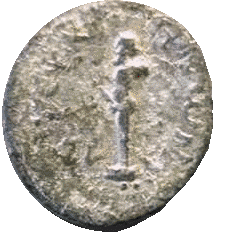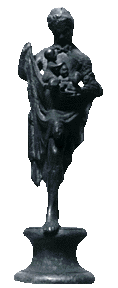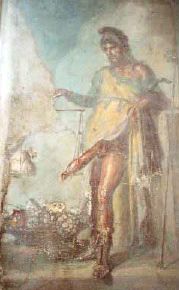 Roman Coin showing the god's most prominent feature |
PRIAPUS
 Roman Coin showing the god's most prominent feature |
Despite his eventual appearance on the Greek scene, Priapus was never anything more than a minor
deity, or, as Powell would have it, an "amusing" and benevolent spirit, to the Greeks. But to
the Romans he was very powerful indeed. Powell describes the Roman practice of "suspend[ing]
little tables with clever, highly obscene poetry from the god's phallus" (154) as if it were
some kind of party trick. This practice was indeed common, but it was done with far more
reverance than Powell's descriptions would imply.
The truth is, this funny-looking fertility deity was one of the most common figures in Roman
votive art and furniture. In the
votive figurines, he is often shown with his arms spread wide, holding up the corners of an
enormous apron in which are piled fruits and/or flowers. Or, as in the case of the figure to
the left, babies. The center of the apron is also supported, propped up by his enormous
member--which is usually shown as big around as his arms.
Priapus is similar in many ways to Pan, although Pan is associated almost exclusively with rural settings. Like Pan, Priapus was sometimes said to be the son of Mercury. Sometimes he was supposed to be the son of Venus by Adonis, who was one of those vegetative demigods who die and rise again, like the Sumerian Dumuzi or the Orphic interpretation of Dionysus. In Roman art he is sometimes shown with Venus, as in this marble statue found at Pompeii. Here's another statue of the same sort, one that I think is remarkable because it's the only statue I've ever seen that makes Venus look ugly. This must have been a cut-rate sculptor.
Most often, however, Priapus was said to be the son of Bacchus (Dionysus) himself and to enjoy the company of Bacchus's wild retinue of nymphs, maenads, and satyrs. Silenus, Bacchus's jolly, drunken companion, was one of Priapus's favorite cronies. Donkeys, which are associated with Silenus, were frequently sacrificed to Priapus. Donkeys were also sacred to Vesta for the opposite reason: as Paul explained in his first magazine article, their braying was said to keep Priapus from bothering the virgin goddess.
Check out this amusing Renaissance painting that features Priapus, Silenus, and a betraying donkey (plus Mercury in a goofy-looking helmet): The Feast of the Gods by Giovanni Bellini and Titian. According to the story the donkey's braying woke up the nymph Lotis just as Priapus was about to ravish her. She fled, but in the end she was only able to escape by turning into a lotus flower.
To the Romans, Priapus represented fertility and all things that grow, including wealth. The Romans were an extremely urban and commercial culture, with a thriving middle class. Their commercially based society, very different from the Greek culture with its heavier emphasis on agricultural values, produced a different view of the gods. Their needs were different.
We saw last week how the Penates protected Roman household goods. Greek household goods weren't really all that extensive, despite the descriptions of Menelaus's obscene and ill-gotten wealth in Book Four of the Odyssey. Except in the case of palaces, classical Greek houses were small and furniture was simple. Most wealth was counted in terms of herds or land; wealth inside the home was usually described in terms of craftsmanship, such as beautifully decorated pottery or textiles that had little inherent value outside of their obvious aesthetic qualities.
 With the advent of the far-flung Roman empire came an emphasis on luxury goods and
items made of valuable materials. Wealth was measured similarly to the way we define wealth in
our own society: money and valuable goods. Houses became much more elaborate.
With the advent of the far-flung Roman empire came an emphasis on luxury goods and
items made of valuable materials. Wealth was measured similarly to the way we define wealth in
our own society: money and valuable goods. Houses became much more elaborate.
The image of Priapus to the right, a fresco from the House of the Vetii at Pompeii, is probably the most famous picture of him. You'll find a black and white photo in your textbook on page 154. He is weighing his phallus against a huge sack of money, while beneath the scale the artist has depicted various symbols of abundance in the form of platters of fruit and vegetables. Along with Mercury, the protector of merchants, Priapus was a patron of the rising middle class. He is wearing the "Phrygian cap"--a symbol of freedom, frequently adapted by freed slaves--and according to tradition he is depicted with ruddy, healthy-looking skin.
This deity's name has found its way into our own language: even today you sometimes hear somebody called a "Priapus." In the modern sense, however, there is seldom a sacred or fertility overtone and the term simply refers to a man--never a woman, for obvious physical reasons--with a voracious sexual appetite.
To read more about Priapus, click here for his entry from the Encyclopedia Mythica and here for his page at the Greek Mythology Link.